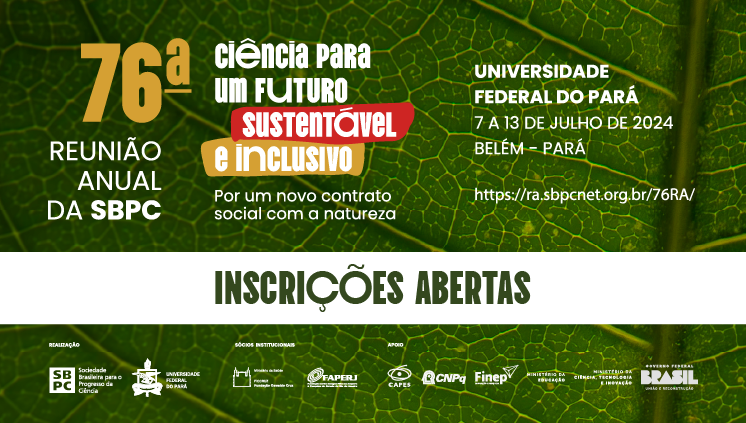The 76th Annual Meeting of the Brazilian Society for the Advancement of Science (SBPC) is being held. Free registrations It is open until July 12, 2024 for those interested in participating in the event Without receiving materials (Printed schedule, badge, eco bag and folders). with the subject ““Science for a sustainable and inclusive future: for a new social contract with nature”the event will be held from July 7 to 13, 2024 at the Universidade Federal de Pará (UFPA) Guama Campus in Belém.
Anyone who registers for free and completes the accreditation at the SBPC Secretariat, which will be installed at the UFPA during the week of the event, will receive an online certificate for general participation (no workload and no description of activities).
Registration and payment of the fee, which ranges from R$ 40 to R$ 380, depending on the category of registrant, is only necessary for those who wish to participate in mini-courses and mini-webinars, submit a work or purchase material event. For those who would like to submit works for the poster session, the deadline is March 26Or while there are vacancies.
The Annual Meeting will include conferences, roundtables, panel discussions, in-person and virtual mini-courses, poster sessions, cultural activities, exhibitions, interactive displays and other programs aimed at students and teachers in basic, technical or higher education, professional researchers and the general public.
Claudia Linhares Sales, Secretary General of the SBPC and responsible for coordinating the event, emphasizes that the 76th Annual Meeting will be a unique opportunity to echo voices and coordinate meetings between institutions and researchers geographically distant from the country. Especially in the Amazon region, is that people are saying that their science is not being heard, and the SBPC will be a channel, not only to replicate this dialogue, but also to strengthen this dialogue with the rest of Brazil. Because biodiversity is different, we have six biomes spread across our land, but the problems may not be vastly different. “Just as the problems of education and appreciation of science are not very different,” he says.
According to her, the SBPC is expected to continue the Amazonian dialogues, giving more visibility to researchers and academics in the region in a pre-COP30 scenario, which will also be hosted in Belém, in 2025. “Great discussions at COP30, because solutions to the Brazilian Amazon problem must “Finding it in Brazil, with the science that is done here, because those who know the Amazon best are the local scientists.”
The local event website is now also available (sbpc.ufpa.br), with information about local notices, the city of Belem, among others.
annual meeting Created in 1948, the SBPC is an entity dedicated to defending scientific and technological progress and educational and cultural development in Brazil. Each year, the SBPC Annual Meeting is held in a Brazilian state, primarily at a public university. This event brings together thousands of people – scientists, teachers, students of all levels, professionals and visitors, as well as authorities, managers, science and technology policy makers of the country.
The annual meetings of the SBPC aim, at the same time, to discuss public policies in the fields of science, technology, innovation and education and to disseminate progress in science in various fields of knowledge to the entire population. Among the conferences, roundtables and panel discussions, activities from the SBPC Innovation, SBPC Afro-Indigenous and SBPC Education programmes, will be implemented. The SBPC Annual Meetings are the largest scientific event in Latin America, and are open to everyone, with attractions for all ages and interests. Plan ahead and get involved!
for more information: https://ra.sbpcnet.org.br/76RA/
Text: Science Magazine
Graphic Art: Alexander Souza – ed.ufpa

“Hardcore beer fanatic. Falls down a lot. Professional coffee fan. Music ninja.”






More Stories
The law allows children and adolescents to visit parents in the hospital.
Scientists pave the way for the emergence of a new element in the periodic table | World and Science
Can dengue cause hair loss? Expert explains how the disease affects hair